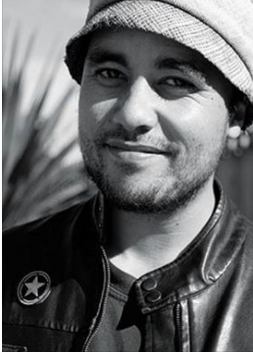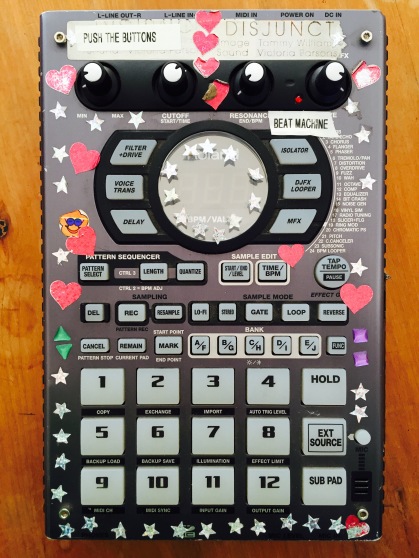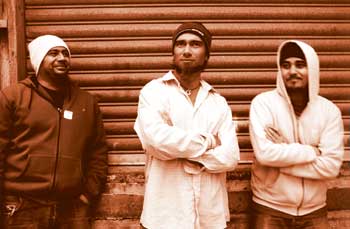A series of interviews with people about the work they do.
Riki Gooch is a drummer and percussionist. He was one of the original members of the much-loved Trinity Roots, and is now the drummer in psychedelic dance band, Orchestra of Spheres. His solo album as Eru Dangerspiel, Great News for the Modern Man, was released in 2010 and he also creates music under the name Cave Circles. Riki lives in Wellington.

“Most people think that a band is three musicians and a drummer.”
–Riki Gooch
Interviewer
Do you call yourself a drummer or a percussionist?
Riki Gooch
If I want people to take me seriously I’ll call myself a percussionist. Most people think that a band is three musicians and a drummer. I think Animal from The Muppets helped form this really negative stereotype of drummers, that they’re ‘special people’.
Interviewer
What’s the difference then?
Riki Gooch
Well, with percussion, the role is quite varied and would cover a wider range of instruments like timpani, snare, tuned percussion, marimba. As a drummer you’re mostly playing a drum kit, like a typical American kit that you find in a rock band; kick drum, snare, toms and high hats.

Riki Gooch’s favourite instrument: SP – 404 sampler
What about when you’re playing the 404?
The term ‘producer’ has been going around for a while – it’s where people sit in their bedroom and sample a bass drum and a snare drum and a vocal sample and then all of sudden they’re a producer, which I think is a bit generous. It’s a compositional tool, and you can use it live. It fits into the percussion family quite nicely, because you have to play it.
What does a drummer have to do then?
If you’re doing your job you should keep everything feeling right and keep the momentum of the music moving nicely. Steve Gadd, a famous American drummer, said, ‘A good drummer makes every thing feel good,’ and I reckon he nailed it.
Interviewer
Do you get paid for your work as a drummer?
Riki Gooch
I’ve found that the more you get paid in terms of playing on a job, the worse the music is. Quite often there’s no money in the interesting projects but you do them because they’re exciting and challenging.
I don’t make a living from it. I did for a short while when I was playing the drums full time, but to do this you spend a lot of energy helping other projects which you might not be into, and when it comes to making your own music you’re exhausted.
I think to make good music you need to do other stuff, outside of music. That’s why I started making pizza as a day job. That became a nice balance because then it meant I didn’t have to do drumming jobs I didn’t like.
Interviewer
So you’re drawing a line between making drum sounds and making art?
Riki Gooch
I guess so, each project or job is always really different. You might have a singer/songwriter where you just go in and play the song. Sometimes you’re asked to bring in ideas to help it along, and they’re the most exciting jobs – where you’re asked to bring something to it.
Interviewer
How did you get into drumming?
Riki Gooch
I never thought of playing music as a job, I always just played music. And with Trinity Roots we were busy and could make a bit of a living off that because we were doing lots of gigs. I met lots of people and after Trinity a lot of work started coming in, and one job leads to another. Your latest album becomes your business card.

Trinity Roots – Rio Hunuki-Hemopo, Warren Maxwell, Riki Gooch
Interviewer
Was Trinity the first band you were in?
Riki Gooch
Yeah, it was the first band that recorded and toured. In Dunedin I was in a bunch of bands but more for fun, they weren’t bands with a press kit or a music video.
Interviewer
Did you and Rio [Hunuki-Hemopo, bass player] and Warren [Maxwell, guitarist and lead singer] make a conscious decision to be a professional band?
Riki Gooch
No, it just kind of evolved like that. Trinity started in a really good place, it was so different to anything I’ve ever experienced and was quite a special time. The idea was just to do some café gigs, because we were all at school either teaching or studying and we wanted to get away from music theory and just do one chord, three chord songs. People liked it and it just kept growing, we never imagined we’d do as well as we did.
Interviewer
Can you be your true self working as a drummer or do you have to wear a suit of armour to do the work?
Riki Gooch
It depends on who you’re working for. There’s been cases where I’ve really had to wear a suit of armour because there’s a big budget involved and it’ll be for a big label or a big artist so you have to be really ‘on’ all the time, because there’s so much money involved.
Interviewer
Does that affect your playing?
Riki Gooch
It does, yeah. You’re just there to do a job like a plumber coming to fix a tap and it’s quite obvious whether it’s working or not. But in the Orchestra of Spheres who I’m playing with now, I totally bring myself to it, there’s no weird ego/hierarchy thing going on; it’s just a very generous musical environment.
Interviewer
What’s the strangest gig you’ve ever played?
Riki Gooch
I did a solo gig at an outdoor BBQ restaurant just out of Beiing, in China. It was like a shanty town, old and run down and in the middle of the restaurant was this massive blue cellphone tower. Some locals got together to rewire a PA system so they could get some sort of sound coming out of it. It was just me on the drum machine and I played lots of banging techno. Heaps of kids turned up. At the BBQ we ate sheep’s penis, worms, all sorts of crazy stuff. I hope they liked the music.

The blue cellphone tower in the middle of the BBQ restaurant, China
Interviewer
Do you think people can learn good timing?
Riki Gooch
Yep, totally. We’re constantly living in a state of rhythm and rhythmic patterns just through having a pulse and breathing. The way to get timing in a musical context is through repetition; playing to a set time with a metronome. That way you train your brain and your body to be consistent with the time, with the pulse. I think anybody can learn it if they spend the time and repeat it enough, do the 10,000 hours thing.
Interviewer
I heard that when most people clap along to music they clap on the first and the third beat.
Riki Gooch
It’s true most people clap on the 1 and the 3 which is always pretty funny.
Interviewer
Do you?
Riki Gooch
I have no idea what I do! Sometimes I catch myself playing around with patterns in my head, so I probably don’t clap on the 1 and the 3.
It’s funny though, how people feel the need to join in – there’s a song we do with the [Orchestra of] Spheres which starts with a clapping pattern that Nell and Erika play. When they start clapping everyone in the audience starts clapping along and it always gets really messy. On stage you can’t hear what’s going on. It’s this weird social cue we have as humans, as soon as anyone starts clapping or implying a beat we feel we need to join in. We probably don’t need to.
Interviewer
It’s a strong impulse though.
Riki Gooch
Yeah, I guess the thing is that music is a social act – it’s a survival mechanism, we used to communicate rhythms to tell people the food was ready, or that there were people coming to invade your village.
Interviewer
Yeah, armies used to march to the beat the drummer made – apparently they made the drummer a child so they were smaller and harder to aim at.
Riki Gooch
That’s a good idea!
Interviewer
What’s your favourite time pattern?
Riki Gooch
I’m really into playing in groups of 7. There’s a different momentum, a different energy to it. 9 is really good, I’m not too sure why though. I guess it’s the way your brain feels when it has to work through those different time signatures. I made a piece last night in 11/8, just a little experiment and that was quite cool too. It’s interesting because time patterns have different energies. 4/4 is earthy, you know, it’s dirt and soil and quite centered. Then you get up to your 5s and 7s and they feel more cosmic, off the planet.
Interviewer
Have you got a mathematical brain?
Riki Gooch
I think you do as a drummer because you’re always subdividing groups of things. But I wasn’t good at maths at school, I was more focused on music in school than on maths. But there’s definitely a strong element of maths in music especially in harmony, the harmonic series and how that all works. Then there’s the rhythm tree, one beat can split off into other things. But that maths is quite specific to music.
Interviewer
What do you like the most and the least about your job?
Riki Gooch
I always loved feeling and seeing a connection happen with the audience, whether they’re dancing, or getting lost in the music or just enjoying it. Hearing the end product after all the rehearsal and practice is good.
I love the feeling of playing too, when you get to that stage where you’re not really thinking about anything, you’re just in a state of relaxation. I think it’s really important to be relaxed with music. It’s kind of like a meditation because you’ve got all these things going on, but being still is really crucial.
I also love the community of drummers too, especially in Wellington, there’s a bunch of people sharing ideas. When you decide to become a drummer you’re showing a strong personality trait, you know? You want to be at the back of the band, you don’t want to be at the front.
The thing I don’t like is the packing down, carrying stuff around.
Interviewer
Do you think drummers are the fittest people in the band?
Riki Gooch
Yeah, it’s cardio workout, so I guess you do get pretty fit. But then there’s some amazing drummers who are monster-sized drummers, extremely overweight. In the end it would depend on the music; if you’re playing death metal you’re going to need to be quite fit.
It is really physical though – I’ve shredded my hands so many times with the friction against the sticks. I don’t play like that anymore. It was mostly with Trinity where the songs were quite loud and full-on. Your hands start sweating and the wood’s constantly rubbing against your skin and you finish the gig and you’ve just got these big chunks of skin ripped off, it’s quite disgusting. Blood all over the drums.
Interviewer
What did you want to be when you were 7?
Riki Gooch
I wanted to join the air force and be a pilot and also be a doctor, possibly at the same time. When you’re seven you just think I’ll be a pilot and once I’ve done that I’ll be a doctor. For a science fair project I did a thing on the aorta and I built a heart. I was really into how the body works, but then music started seeping in and became like a passion, but I never imagined it as a job, just as something that I’d do.
Interviewer
Would you encourage young drummers to purse music, but say ‘you have to get a trade as well’?
Riki Gooch
Yeah, I think you need a balance, especially if you’ve got a family because sometimes the work’s not there. Most of your money comes from traveling and doing gigs, but if you’ve got kids you can’t go away all the time. Warren [Maxwell of Trinity] was a chippy before he did music, which was a really onto it, I reckon.
Interviewer
What did you think of that film, Whiplash?
Riki Gooch
It was awful. For a start I thought the drumming was quite average, I thought they could have paid a bit more attention to that seeing as it was a film about a jazz drummer. Also, the whole thing was what I hate about the jazz scene – this competitive macho thing with music – where they’re like ‘Are you a dragger or are you a pusher?’ It’s a beautiful art form, it comes from the ghetto, it’s not a sport. I didn’t like that film.
Interviewer
Do you encounter many prejudiced attitudes in your line of work?
Riki Gooch
You do. Even with my parents, they’re like – ‘So you got a real job yet?’ Music’s not a job. I always used to think it was a bit of an insult, but now I kind of get what they mean. That prejudice can be negative and positive – like, ‘Wow you’re a drummer’, and then people want to tell you all about their favourite albums. Some people ask, ‘What do you do?’ And when I say ‘I’m a drummer,’ they’re like, ‘Right, fair enough, enjoy your hobby do you?’ There’s that idea about music being a hobby. Which is maybe a good idea anyway!
You get prejudice from some classical players too. I did a gig with Bic Runga and an orchestra in Christchurch once and I had the drum kit up by the conductor and they barricaded me in this glass case, and the first violins were giving me these looks, like – ‘What’s that drummer doing down the front? Put him in the cage!’
Interviewer
What are the people like that you work with?
Riki Gooch
Mostly awesome, amazing people, and a real mixed bunch. I’ve got friends who are great musicians who go hunting pigs, and other people in the same band who might hate that idea. The common thread is that most musicians are quite sensitive to the world and to what’s going on emotionally. They’re also quite driven people.
Further up the chain you go with musicians who are very successful, who are earning lots of money, the tendency to be an arsehole is greater, which I guess comes partly from the pressure they’re under, the pressure to be good again. I think those artists get removed from the real world because of their status.

Riki in Orchestra of Spheres head-wear
Interviewer
What sort of clothes and shoes do you wear to work?
Riki Gooch
Your footwear needs to be light, like kung-fu or Commando M type shoes. If the soles are too thick it’s hard to feel your way around. I like to wear loose clothing, so I can breathe and feel comfortable. But with the Spheres we’ve got lots of costumes so often I might be wearing a turban with a bunch of LED lights wrapped around it. We wear glasses too which sometimes is problematic when you’re trying to cue each other; no one can ever see what’s going on. It can lead to some confusion on stage.
You sweat. Especially once you add the heat from stage lights and a crowd of people heating up a room. I always take a change of clothes for after gigs so I don’t get sick. After a gig you’re walking outside at night and you get cold.
Roger Sellers, a treasure of a man whose been teaching at Conservatorium [of Music in Wellington] for a long time now told me years ago, ‘The first piece of advice I have is when you finish a gig, have a shower so you don’t get cold’. I was like, yep, I’ll remember that Roger!
Interviewer
If you didn’t have to work for money what would you do with your time?
Riki Gooch
I’d become a full-time Dad. That would be the dream job, I’d do that all day. And still do music. Those two things.

Riki and his daughter, Maia
Interviewer
What’s your Star sign?
Riki Gooch
Capricorn. My birthday’s the same date as Mel Gibson and Christina Aguilera.
Interviewer
Peanut Butter – crunchy or smooth?
Riki Gooch
Crunchy. Or both actually, a smooth base down first then crunchy on top. That’s quite good.
Click link below to watch Riki Gooch giving a short timpani demonstration.
https://vimeo.com/moogaloop.swf?clip_id=162927818&force_embed=vimeo.com&fullscreen=1
April 2016, interview by The Invisible Writer.